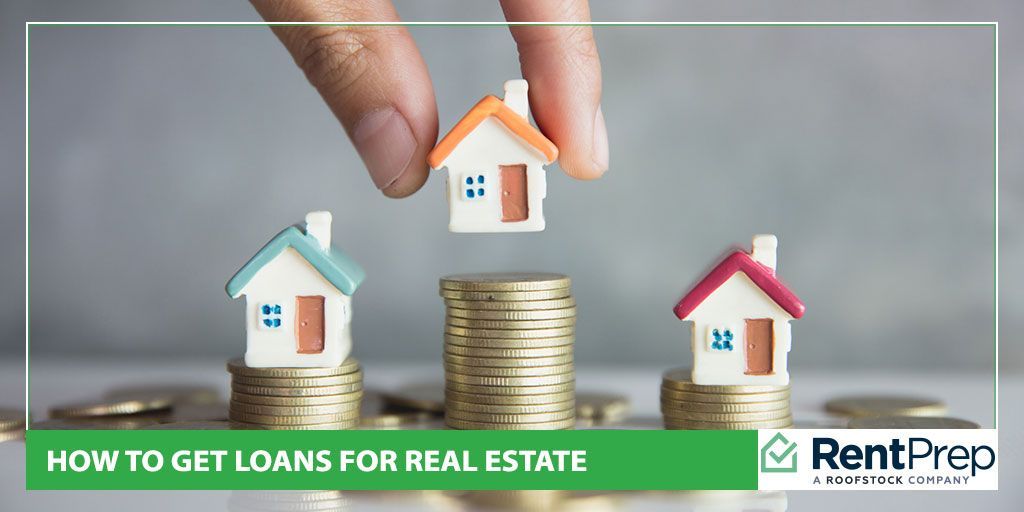
Whether you’re new to the business or haven’t yet needed investment loans, learning how to get loans for real estate investment properties is crucial to success. Without loans, your business may not have the capital to expand, renovate, and nurture properties into profitable investments.
What are the biggest challenges while securing real estate investment loans, and how can you get these business loans? Missing out on the right loan opportunities can lead to high interest rates or complex terms, ultimately cutting into your profit margin.
Financing for investment real estate comes in many different forms. Learn more about how to get real estate investment loans today.
A Table Of Contents On How To Get Loans For Real Estate
There are various options for financing investment properties, from conventional to hard money loans. Get to know your expansion options today:
- What Are Real Estate Investment Loans?
- Financing For Investment Real Estate: Assessing Your Options
- How To Get A Real Estate Investment Loan: Top Tips
- How To Get Real Estate Investment Loans: FAQs
- Real Estate Investment Loans: You’ve Got Options
What Are Real Estate Investment Loans?

Real estate investment loans help investors purchase property that will produce income. Usually, these loans are mortgage-based, but there are also hard money loans primarily used by house flippers.
But, there are far more than just these types of loans to consider. While all financing options for investment properties ultimately help you acquire additional real estate, there are significant differences in how each financing type works.
As you read through today’s guide, remember that every loan won’t fit every situation. If you have a specific situation you need financing for, pay close attention to each loan’s specifications to see what the best fit would be.
Financing For Investment Real Estate: Assessing Your Options
What are the different real estate investment loans commonly used? Let’s start by covering these financing options in detail.
#1: The Conventional Bank Loan
Most investors are familiar with conventional financing. Homeowners often use conventional mortgages when purchasing their primary residence, and these loans can also be used for some investment properties.
Fannie Mae and Freddie Mac finance conventional mortgages. While not backed by the federal government, these financiers are regulated by specific guidelines.
You will likely need to put down at least 20% of the purchase price to obtain a conventional mortgage loan for an investment property. Some lenders will require up to 30%. The specific amount needed to qualify for the loan will vary.
Other factors that affect your eligibility for this type of loan are your credit score, credit history, income, and assets. These factors are evaluated to ensure the borrower can afford existing and future loan payments; the evaluations typically don’t include future potential income in the calculations.
#2: Hard Money Loan Option
Consider a hard money loan when purchasing an investment property for a fix-and-flip rather than a long-term investment.
Hard money loans are tied to tangible assets and given by private lenders, financing groups, and investment companies. The money is funded quickly and must be paid back quickly, too. These loans have higher interest rates than conventional mortgages but require a similar down payment.
Most lenders focus on the property’s profitability instead of your creditworthiness when determining if you qualify for a hard money loan. This can make getting a hard money loan easier, but that doesn’t come without increased risk. Terms typically require quick repayment, and fees for these loans are higher across the board.
#3: Private Financing
In some situations, you can obtain financing from an individual through a private money loan. Private loans from friends, family members, or investors can be used to purchase and repair investment properties.
You’ll need to build strong relationships with potential lenders over time. You’re more likely to use this investment type once you have a solid reputation in your local community. Joining local real estate investment groups and networking events can help you connect with potential lenders.
Terms on private money loans differ from other loan types, and the terms can vary. Legal contracts between individuals determine the loan terms, so it’s essential to consider them carefully before signing any documents.
#4: Harnessing Your Home Equity
A few types of equity financing can be used to invest in real estate:
- Home equity loans
- Home equity lines of credit (HELOC)
- Cash-out refinancing
These options allow homeowners to borrow up to 80% of their home’s equity to invest in real estate.
Home equity loans are best for investors who already own property with equity. The loans borrow against that equity, and the amount is paid out in a lump sum at a fixed interest rate.
HELOCs have variable rates and can be used and paid off within set periods.
With cash-out refinancing, investors take out a mortgage larger than necessary and use the cash difference to make their investments.
Each option has pros and cons, so it’s important to review the details closely when determining if you should use your equity this way. Comparing your anticipated return to the increase in interest that will be paid over time if you use a home equity financing option is an excellent way to start this process.
#5: Government-Backed Loans
Some government-backed loans work on investment property, but most require you to live in the purchased property. These loans may still be good options if you consider purchasing a multi-family property to live in and rent out.
FHA loans, for example, would apply to a four-unit home. You could collect rent from the other units while living in the remaining unit. You must occupy that unit for at least one year to qualify for an FHA loan.
Similarly, VA joint loans allow military borrowers to purchase multi-family properties with up to seven units as long as they will be occupying one of those units.
How To Get A Real Estate Investment Loan: Top Tips

When determining how to get a business loan for real estate, there are a few things that experts recommend you do to ensure you stand out without compromising long-term success.
Tip #1: Prepare Your Down Payment
Mortgage lenders want to see that investors are able to put at least 20% down. The more you can put down, the better. Larger down payments may help reduce your interest rate. Down payment is necessary to lenders because mortgage insurance doesn’t apply to investment properties, and it reduces the risk for the lender.
Tip #2: Show Your Strength…In Numbers
No matter how friendly and personable you are, that will go nowhere if your credit score is below 740. Investors with credit scores under 740 will be subject to loan rejects and higher interest rates. It’s unlikely that investors with credit scores lower than 600 can obtain a property investment loan without taking a more unconventional approach.
You also should be able to show you have reserves to cover expenses for each investment property you currently own. These assets matter to lenders.
They will also want proof that you have success as a property manager. A history of your rental management will show this, so consider how you can present the value you offer as a borrower.
Tip #3: Prep Your Books
Lenders will want to take a look at your books. Copies of current leases, proof of rental income, and tax returns clearly show how your business is doing. Ensure you have these documents accurately prepared as you search for investment financing.
Tip #4: Shop Around
Don’t stop at your first lender if you don’t think the terms are quite right. Explore your options with mortgage lenders and other financial institutions, such as a neighborhood bank, to see if you can find an option that better suits your business.
Tip #5: Stabilizing Your Investment
After qualifying for an investment loan and purchasing your next investment property, you’ll want to shift from buying to managing mode. To stabilize your investment, rent it to the right tenants as soon as it’s ready.
Like finding the right loan, finding the right tenants is challenging. Handling dozens of property management tasks daily doesn’t make it any more accessible. Most landlords find it difficult to juggle their current obligations with planning for future investments, let alone also needing to complete tenant selection processes.
That’s where RentPrep comes in. Our services make it possible for you to screen tenants quickly. Our packages offer background checks, credit reports, and more in a convenient way so that you can spend more time managing your investments and less time digging through these files. Find out more about our services and pricing today.
How To Get Real Estate Investment Loans: FAQs
A complete understanding of loans is complex as your financing options change over time and every lender has specific requirements. Read through these FAQs to continue deepening your knowledge of investment loans.
What Do I Need To Qualify For Investment Property Financing?
Though some commonalities exist between services, every lender has different requirements to qualify for financing.
Hard money lenders often move with hot markets and are willing to boost investors working on properties with high after-repair values. In contrast, private lenders may be willing to support an investor with whom they have a good relationship.
The lenders with the strictest requirements are usually conventional loan lenders. Loans, including home equity loans, require a specific income, credit score, and other qualifications to be considered.
If there is a specific loan type that you’re interested in, talk with lenders to find out what their requirements are and how to proceed. This information will give you what you need to start planning the next stage of financing your investment properties.
What Are Other Options For Financing Investment Properties?
If the most common types of loans for real estate investing aren’t working for your current situation, don’t give up just yet. Other options require more creativity (and often more work) to try. Give these types of financing approaches a look.
Peer-To-Peer Financing
Investors connect directly with borrowers to loan money as an alternative investment in this type of financing. This means you could get the funds needed to finance another investment property directly from another investor supporting your activities.
Flipper Loans
Fix-and-flip loans are short-term, hard money loans. They have high interest rates and aren’t ideal unless you plan to purchase and resell the property in less than 12 to 18 months.
Insurance Policies
In some cases, you may access cash via your life insurance policy. This depends on the type of policy, as not all are liquid assets. Borrowing against that money makes it possible to acquire a new investment property. Some lenders will view access to this type of policy as favorable.
Personal Loans And Credit Cards
Personal loans of up to $100,00 may help you finance an investment. Some credit cards also provide access to necessary cash to round out a down payment or investment purchase. These options have very high interest rates, so they are not usually the first (or second) choice of experienced investors.
Can I Put Less Than 20% Down On An Investment Property?
Putting down less than 20% when financing an investment property is not ideal. Unlike primary homes, investors are expected to pay at least 15% as a down payment. A larger down payment is required to show higher financial stability than is necessary when purchasing a home.
Being able to put down a minimum of 15% is necessary when financing an investment property, but most recommend investing at least 20% into the down payment.
How Can I Get The Best Investment Property Mortgage Rate?
Most financing experts say there are two primary things you can do to get the best mortgage rate when financing a property. First, ensure that your credit score is over 700. This shows them you are reliable. Second, ensure you have enough capital to make a down payment of over 20%.
By doing these two things, you’ll increase your chances of getting the best mortgage rate. Beyond that, the thing to do is shop around. Check out many options before finalizing which company is best to work with, and keep your findings for your subsequent financing round.
How Many Investment Properties Can I Own?
There is no legal limit on the number of investment properties you can own overall, though local ordinances may limit certain types of investment. There are restrictions if you plan to finance your investment properties through mortgage lending.
Conventional mortgage lending only allows you to have ongoing financing for 10 properties at a time. If you don’t have free capital to invest in properties without traditional mortgage financing, you cannot invest in more than 10 properties. Otherwise, you can invest in as many as you have the capital to obtain.
Real Estate Investment Loans: You’ve Got Options
As you’ve seen today, you can take many different paths when looking to get loans for real estate investment. The right fit varies from person to person, business to business. Understanding your options in more detail helps you determine your best strategy.
Consider the following factors as you determine which type of financing to move forward with:
- How much free capital do you have to cover a down payment?
- Do you have any outstanding mortgages at this time?
- Would taking on another loan prevent your business from being profitable?
- Are you flipping the property or working in a hot market?
- Do you have good relationships with any lenders offering great rates?
- Do you meet the necessary qualifications for a traditional loan?
The goal of answering these questions is to paint a picture of your current situation. It will make matching your circumstances with the right loan option easier. Gather this information and look at what makes the most sense for your current needs – you’ve got options. You just have to choose which one you want to try!

